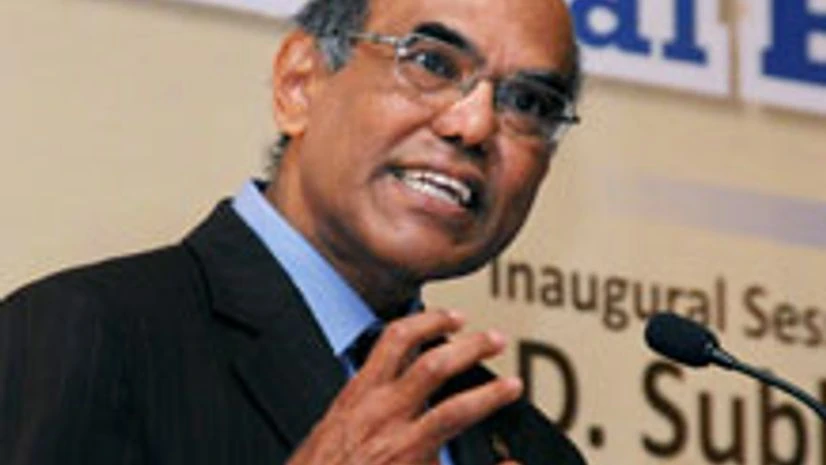Throwing the ball into the government’s court on the many concerns pertaining to economic growth, Reserve Bank of India (RBI) governor D Subbarao on Friday advised it to follow austerity for the sake of the future. He said a sacrifice of growth by tightening of monetary policy was at best a short-term cost. The economic slowdown being experienced was the result of a reversal of the factors that helped high growth in the pre-global economic crisis period. He warned that the large fiscal deficit would impact the country’s balance of payments.
“The austerity versus growth (issue) being debated in Europe is irrelevant to India. Our concern is austerity for growth. I believe that fiscal consolidation is very necessary to put the economy on a high growth trajectory. And, the fiscal consolidation is largely a political problem,” he said while delivering a lecture marking the golden jubilee celebrations of the Institute of Public Enterprise, here. Subbarao specifically targeted revenue expenditure, which includes spending on welfare programmes. “Borrowing for consumption cannot be sustainable. Achieving fiscal consolidation by compressing the expenditure and not by raising taxes is proved more effective world over,” he stated, while appreciating the government’s commitment to contain the fiscal deficit at 4.8 per cent of gross domestic product this year.
Monetary policy
Strongly defending the tight monetary policy pursued by RBI under his leadership, Subbarao said even if high inflation was driven by supply-side shocks, as had been argued by “pro-growth” voices, monetary policy had a role. “It is not correct to believe that all our inflation is driven by supply shocks only. Indeed, the latest episode of inflation is driven equally by demand pressures...Even if inflation is driven by supply shocks, if that inflation is allowed to persist for long enough, the inflation expectations get anchored...Mainly because people expect higher inflation, you can have higher inflation. So, monetary policy is the first line of defence to ensure that inflation expectations do not persist,” the governor said.
More From This Section
“There was an increase in investments in the pre-crisis years. Investment was financed largely by domestic sales and together with that, we had improvement in domestic and external competitiveness, improvement in quality and quantity of financial intermediation, and productivity improvement. So, if that caused the growth acceleration in the pre-crisis years, it is the reverse conditions that are really causing the slowdown in the post-crisis years,” said.
On slowdown
According to him, investments slowed due to external factors and a number of domestic ones. Business profitability was affected due to infrastructure bottlenecks and rise in input costs. Going slow in fulfilling the commitments on reforms hit business confidence, in addition to governance concerns from Delhi to the village level.
“Even as our growth slowdown was triggered by financial crisis, the slowdown after the crisis is the consequence of all the external and internal consequences,” he said.
On the external front, he termed the current account deficit (CAD) the biggest risk facing the country on Friday. And, said there could never be a situation where capital flows were just about sufficient to finance the CAD. “I call it a Subbarao law,” he added.
He also questioned the notion that rupee depreciation would help raise exports, stating this would be an outcome of an increase in productivity and competitiveness, not of the exchange rate. He also said India had taken a contrarian path against the general perception that CAD would come down in times of economic slowdown, requiring a serious study.
‘We too chase monsoon’
The governor said the monsoon was going to be important in determining the monetary policy in the next three months. “We also chase the monsoon, like millions of farmers across the country.
So, the monsoon outlook, the monsoon performance, is going to be the important factor in determining RBI policy in the next three months,” he said. RBI is scheduled to review its policy later this month.
Earlier, he said while failure of the monsoon or floods in one part or the other in the country caused cyclical food inflation, where monetary policy could offer no solution, the structural inflation caused by higher consumption and demand would keep their hands busy.

)
